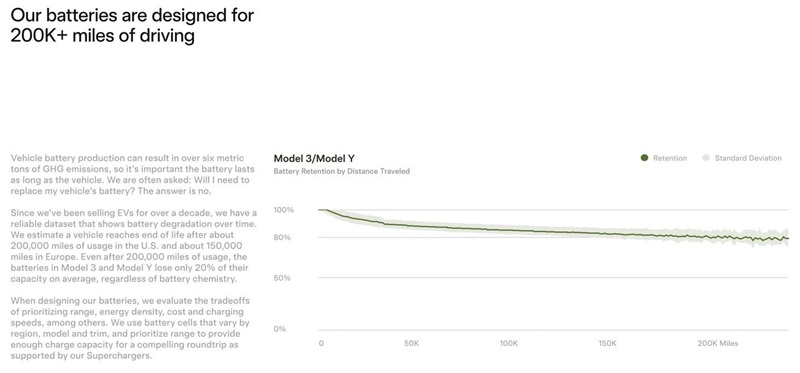On July 2, Tesla disclosed the latest statistics regarding the lifespan of its electric vehicle (EV) batteries. The data reveals that, over nearly a decade of mass production, Tesla EV batteries retain about 80% of their original capacity after an average of 200,000 miles (roughly 320,000 kilometers), regardless of battery chemistry.

However, in the European market, where annual driving distances tend to be shorter than in the U.S., Tesla batteries reach the 80% capacity threshold sooner—typically after around 150,000 miles (approximately 241,000 kilometers). This suggests that, in addition to mileage, battery age significantly impacts degradation. For instance, whether a U.S. owner drives 20,000 miles annually or a European owner drives 15,000 miles, both vehicles will experience a 20% capacity loss over the same period.
Tesla emphasized that while battery capacity gradually diminishes, the batteries' lifespan still far exceeds that of the vehicles themselves. After more than a decade and 200,000 miles of use, most owners are likely to consider upgrading their cars.
Currently, the average age of vehicles on U.S. roads is nearing a record 13 years, prompting potential adjustments in Tesla’s battery longevity and warranty policies. Meanwhile, Chinese manufacturers are already advancing in this area. CATL, the world’s largest battery producer, has partnered with EV maker NIO to offer 15-year battery warranties while limiting capacity degradation to 15%.
It remains uncertain whether Tesla will adopt similar measures. Notably, Tesla’s U.S.-based lithium iron phosphate (LFP) battery factory is nearing completion, with production equipment supplied by CATL.
Next:The Complete Technical Guide to 6kW On-Board EV Chargers: From Specifications to Maintenance
Previous:Essential Forklift Charger Maintenance for Optimal Performance
Contact Person: Miss. Kiki
| WhatsApp : | +8617763224709 |
|---|---|
| Skype : | +8617763224709 |
| WeChat : | +8617763224709 |
| Email : | kiki@lifepo4-battery.com |